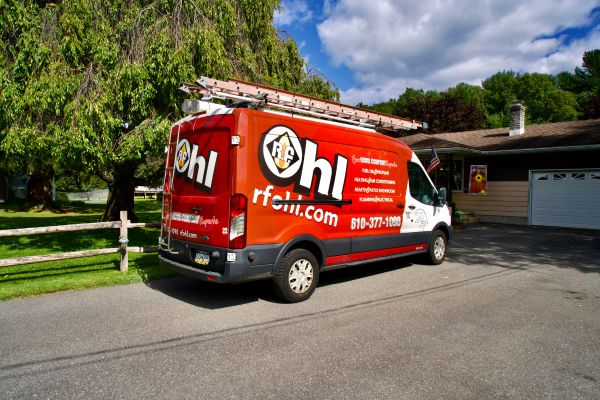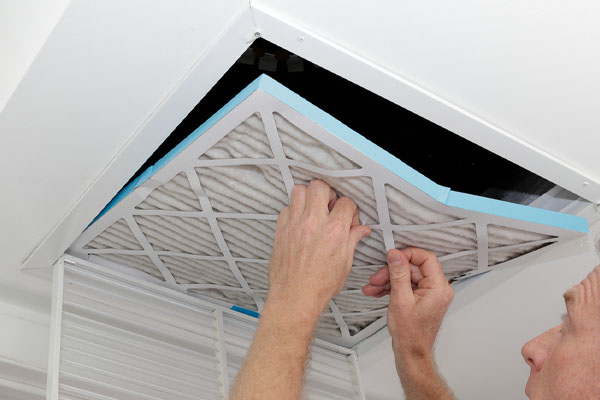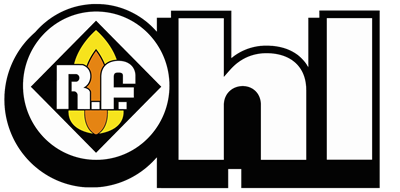Cool & Clean: Best Ways To Prevent Air Conditioner Mold

Mold growth is not uncommon in damp home areas, with air conditioning units being particularly vulnerable. The U.S. Environmental Protection Agency (EPA) highlights three essential elements for mold growth: moisture, a nutrient source, and oxygen. With these conditions often present in cooling systems, air conditioner mold infestations can occur rapidly, posing health risks to occupants.
Air conditioner mold can spread throughout your home, impacting human and animal health. To mitigate this risk, it’s crucial to engage certified HVAC professionals, like R.F. Ohl, for routine inspections. These professionals ensure your air conditioning system remains mold-free, promoting a healthier environment for your family and pets.
Continue reading to learn practical methods for preventing mold growth in your air conditioner. By following these steps, along with regular professional HVAC maintenance, you can maintain a clean and efficient cooling system, enhancing the overall air quality in your home.
How to Prevent Air Conditioner Mold
Contents
Mold growth in your air conditioner can result in costly repairs. It’s important to understand that most home insurance policies only cover mold damage if it stems from specific covered events, such as appliance-related flooding.
Therefore, taking proactive steps to safeguard your air conditioner from mold is a health precaution and a financially prudent decision. In the following section, we’ll explore why keeping your air conditioning system mold-free is crucial and provide practical strategies for prevention.
The Dangers of Air Conditioner Mold

While not always life-threatening, mold in the home poses significant health risks, as Medical News Today highlights. Mold releases toxins that can adversely affect the respiratory system, leading to allergic reactions, breathing issues, and conditions such as aspergillosis.
When mold infiltrates air conditioners, the risk escalates further as it spreads quickly throughout living spaces, exposing residents to harmful spores. Also, mold can harm the air conditioner’s functionality, particularly if it reaches electrical components, resulting in decreased efficiency and potentially costly repairs or replacement.
Don’t wait for problems to arise. Schedule a regular tune-up with R.F. Ohl to keep your cooling system in peak condition and avoid unexpected breakdowns. Call us today!
Telltale Signs of Mold in Your Air Conditioner

Detecting mold in your air conditioner is crucial due to the associated health risks. Mold tends to thrive in the moist areas of an air conditioning unit, often making it difficult to spot visually. Moreover, mold spores are typically microscopic and remain invisible until they form larger colonies.
To accurately determine if mold is present in your AC system or elsewhere in your home, it’s recommended that you seek assistance from a professional HVAC contractor. An experienced HVAC professional possesses the necessary expertise to identify mold, even when microscopic spores are invisible to the naked eye. Therefore, you must remain attentive to specific signs indicating mold growth within your air conditioning system.
Signs Of Air Conditioner Mold
- Musty AC Smell: A musty odor is one of the earliest and most noticeable signs of mold or mildew. If you detect an unexplained musty smell in your home, it could emanate from mold growing within your air conditioner.
- Visible AC Unit Mold Signs: Mold, initially microscopic, becomes more visible as it matures and releases spores. Depending on environmental factors like moisture, light, and nutrients, its color can vary widely—black, grey, white, green, red, orange, brown, or purple. These color variations make mold detectable to the naked eye. Watch out for unusual color patches or growths that may indicate mold growth.
- Increased Humidity: If there is a noticeable increase in indoor humidity levels when the air conditioner runs, it could signal mold growth within the unit. Air conditioners not only cool the air but also reduce humidity. If mold obstructs the system’s components, it may hinder this function, leading to unusually high indoor humidity levels.
- Health Concerns: Sudden illness among family members or pets when using the air conditioner might indicate mold contamination within the unit. Symptoms commonly associated with mold exposure include sneezing, coughing, watery eyes, wheezing, nasal congestion, itchy skin, and other allergic reactions. Individuals with asthma may experience more severe symptoms upon exposure.
Unsure about your AC needs? Trust R.F. Ohl’s knowledgeable technicians to provide expert guidance tailored to your home and budget. Contact us for personalized recommendations today.
How to Remove Mold in Your Air Conditioner

Addressing mold in your air conditioner requires the expertise of a qualified HVAC professional due to the complexities and health risks involved. Certified HVAC contractors like R.F. Ohl possess the necessary skills and knowledge to handle air conditioner mold issues safely and effectively. Here’s an overview of the steps a professional may take to remediate mold in your air conditioning system:
- AC Unit Inspection: The contractor thoroughly examines your air conditioning unit and ductwork to identify the extent and location of mold growth.
- Assessment of Your Cooling System: After confirming the presence of mold, the professional assesses the severity of the infestation and devises an appropriate remediation strategy.
- Mold Growth Containment: Containment measures are implemented to prevent the spreading of mold spores to other areas of your home during removal.
- Airborne Spores Filtration: Air scrubbers and HEPA filters capture airborne mold spores and purify the air during remediation.
- Cooling System Mold Removal: Specialized cleaning agents and tools are employed to thoroughly eradicate mold from the affected components of the air conditioner and ducts.
- Air Conditioner Mold Growth Prevention: Following cleanup, the contractor may suggest preventive measures such as improving ventilation, addressing leaks, or installing a dehumidifier to deter future mold growth.
- Regular HVAC Maintenance: Regular HVAC system maintenance is recommended to ensure efficient operation and prevent mold recurrence.
By enlisting the services of a professional HVAC contractor for inspection, cleaning, and maintenance, you can effectively remove mold from your air conditioner and mitigate the risk of future growth. This not only safeguards your home’s air quality but also protects your family’s health.
Practical Ways to Prevent Mold in Your AC Unit

Detecting mold in your air conditioner often indicates an already advanced problem, potentially leading to damage. Therefore, prioritizing prevention is crucial to avoiding the complications associated with mold infestations. Regular maintenance conducted by a professional HVAC contractor is essential in maintaining a mold-free air conditioning system.
Here are essential maintenance tasks that a skilled HVAC contractor will perform to safeguard your unit against mold:
- Disinfecting the AC: A vital aspect of maintaining a healthy air system involves disinfecting the air conditioner, ducts, and ventilation components to eradicate mold and other microbes. Professional HVAC contractors utilize EPA-approved disinfectants for this purpose.
- Cleaning and Replacing Air Condition Filters: Ensuring optimal air quality requires regular cleaning of AC filters every two weeks, especially in high-pollution areas. Additionally, following the U.S. Department of Energy’s recommendation of replacing filters every 45 to 90 days is essential. HVAC contractors are best suited to manage this task effectively.
- Applying a Mold Inhibitor: Employing a mold inhibitor entails using a chemical solution designed for their growth within the air conditioning system.
- Keeping Air Ducts Dry: Moisture accumulation within air ducts creates an ideal mold and mildew growth environment. To combat this, HVAC contractors ensure the dryness of ducts by thoroughly cleaning them, addressing any repair needs, and replacing parts damaged by water.
- Installing a UV Light: UV light is a potent tool for neutralizing various microbes, offering an effective solution to prevent mold growth within your air conditioner. Professional HVAC contractors can install UV lights to enhance mold prevention measures.
Consistent maintenance and proactive measures allow you to enjoy a cool, clean environment free from air conditioner mold. If you suspect mold growth in your air conditioner, contact R.F. Ohl. Call now!
Conclusion
Preventing mold growth in your air conditioner is paramount for maintaining a healthy indoor environment and avoiding costly repairs. You can effectively address mold infestations by detecting early signs of mold, such as musty odors or increased humidity levels, and seeking professional assistance.
Certified HVAC contractors are crucial in inspecting, cleaning, and maintaining air conditioning systems to prevent mold recurrence and ensure optimal performance. Implementing preventive measures, such as disinfecting the AC, replacing filters regularly, applying mold inhibitors, keeping air ducts dry, and installing UV lights, is essential for safeguarding your home’s air quality and your family’s health.
Call R.F. Ohl for Expert HVAC Services
R.F. Ohl is a premier HVAC service provider serving Northeastern Pennsylvania. We specialize in tune-ups, repairs, installations, and replacements. Committed to excellence, our professionally certified technicians are dedicated to delivering top-notch services to each client.
Our experts recognize the significance of a comfortable and energy-efficient home. R.F. Ohl offers affordable solutions to enhance your comfort while reducing energy expenses. Whether you require a repair or a system upgrade, our seasoned technicians will suggest the most suitable options that align with your budget.
We stand behind our work with a satisfaction guarantee. Schedule an appointment with R.F. Ohl today for a free in-home consultation to help you make informed HVAC decisions.
Click here to contact us today or give us a call at (610) 377-1098 if you have any questions. Click the link to view our service area.

Related Articles: